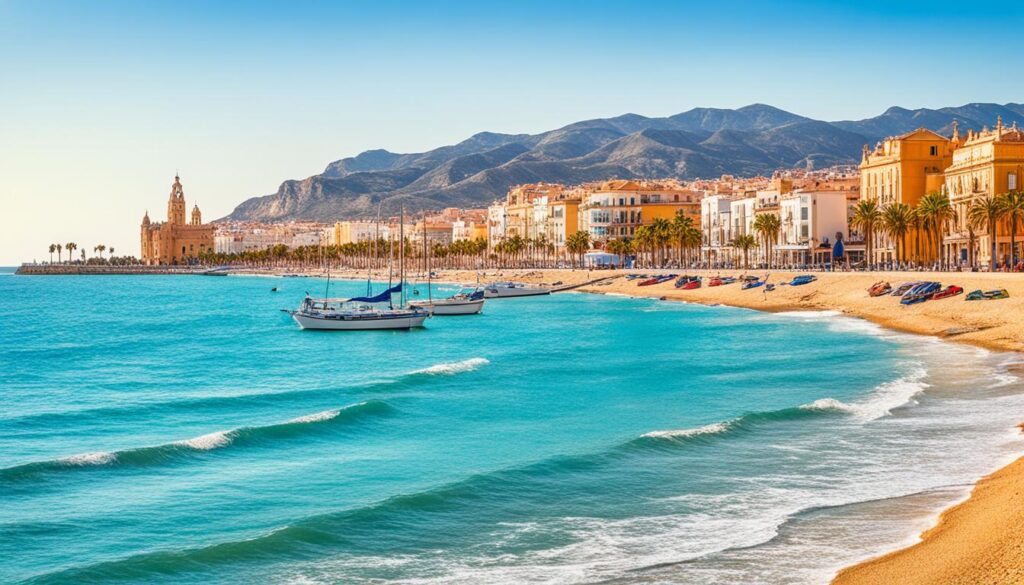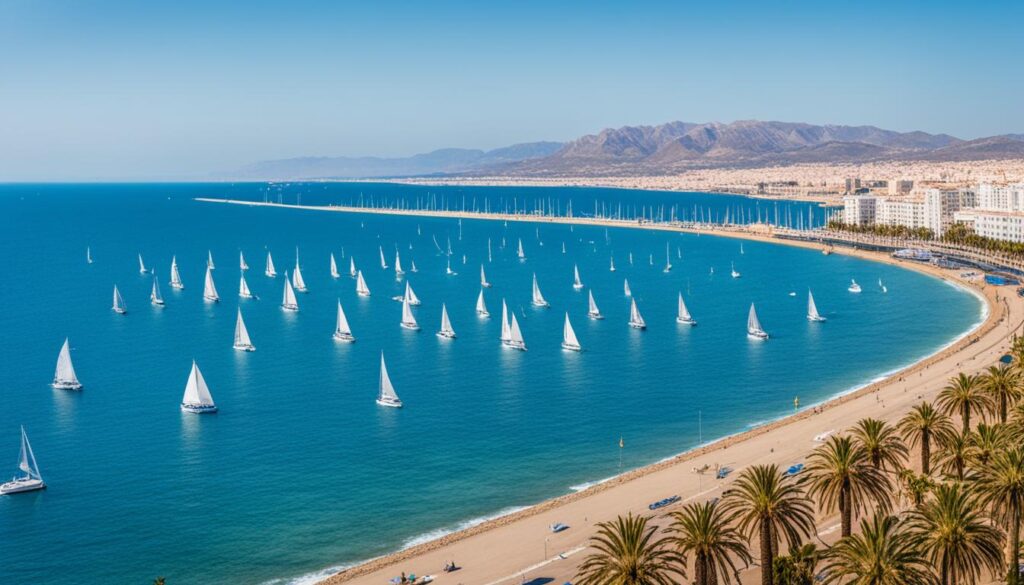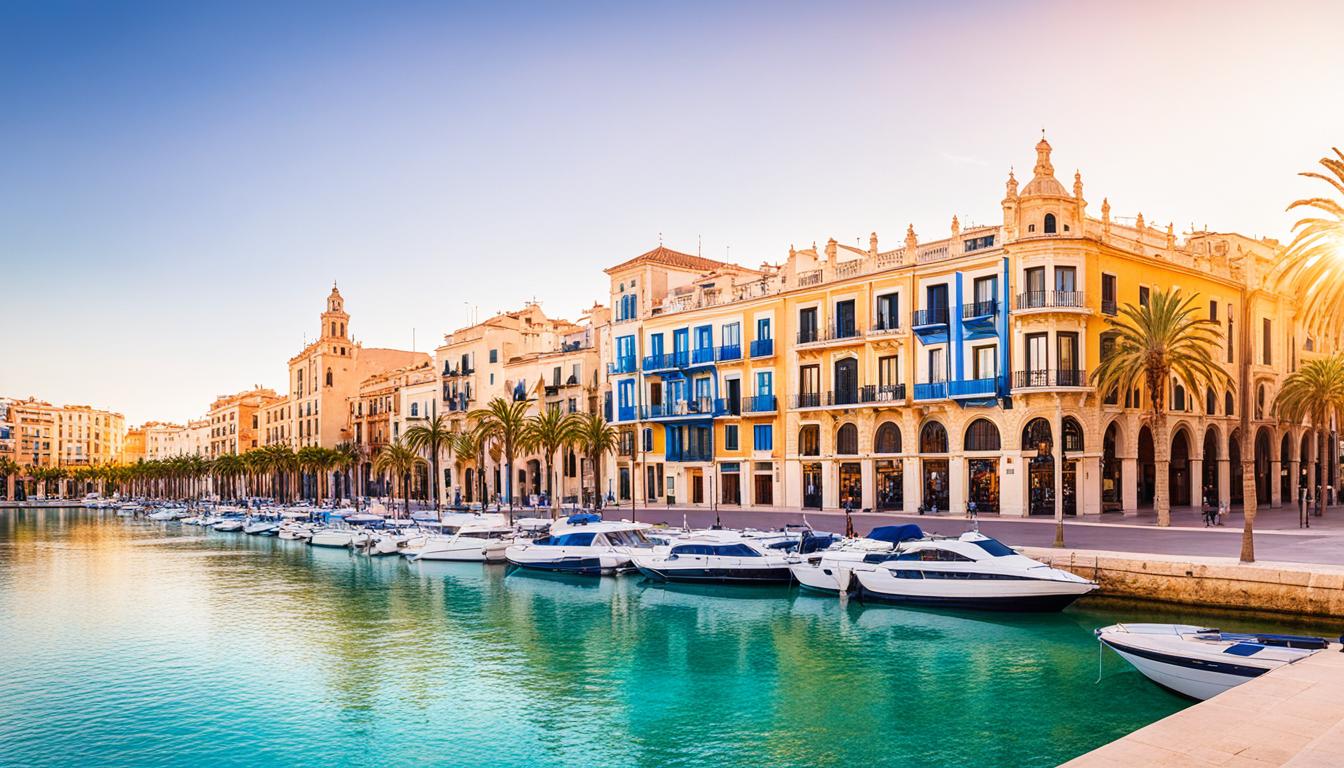Valencia is a city on Spain’s eastern coast, famous for its modern buildings, deep history, and a Mediterranean climate. This climate brings a tropical feel to the city. Summers are hot and dry, perfect for enjoying the Mediterranean sun.
Winters are mild, making Valencia a great place to visit all year. The mix of modern life and a Mediterranean vibe changes how people see Spain’s climate. Valencia is a top spot for those looking for sunny, enjoyable weather.
Key Takeaways
- Valencia, Spain enjoys a Mediterranean climate with hot, dry summers and mild, pleasant winters.
- The city’s location along the eastern coast of Spain contributes to its unique weather patterns and tropical feel.
- Sunshine and warm temperatures make Valencia an ideal year-round destination for beach vacations and outdoor activities.
- The city’s weather patterns are influenced by its proximity to the Mediterranean Sea and the surrounding geography.
- Valencia’s weather data and forecasting models provide reliable information for trip planning and weather-based experiences.
Introduction to Valencia’s Mediterranean Climate
Valencia, a vibrant city in eastern Spain, has a unique Mediterranean climate. This climate makes it stand out from other parts of Spain. It’s thanks to its location between the Iberian Peninsula and the Balearic Islands, with the Mediterranean Sea nearby.
Overview of Valencia’s Geographical Location
Valencia’s coastal spot is key to its mild and pleasant weather all year. It’s close to the Mediterranean Sea and on Spain’s eastern coast. This location creates a special climate that’s different from the rest of Spain.
The city enjoys the sea’s moderating effects. This keeps the temperature steady and prevents big changes.
Factors Influencing Valencia’s Mild Weather
Many factors make Valencia’s climate mild. Sea breezes from the Mediterranean cool things down in summer. The coastal influences also keep the temperature stable and nice all year.
Valencia’s spot between the Iberian Peninsula and the Balearic Islands boosts its Mediterranean climate. This makes it sunny, temperate, and welcoming to visitors from everywhere.
“Valencia’s coastal location and its proximity to the Mediterranean Sea are the primary factors behind its captivating Mediterranean climate, which sets it apart as a true year-round destination.”
Valencia’s Sunshine Extravaganza
Valencia sits on Spain’s sunny Mediterranean coast, perfect for those who love sunshine hours, sunny days, and clear skies. It has over 300 sunny days a year. This makes it a top spot for a warm, sunny break.
The sunshine draws both visitors and locals. It lets them enjoy the outdoors and Valencia’s culture, landscapes, and coast. The city’s clear skies and sunny days make it warm and joyful.
The sunshine is key to Valencia’s farming. The Huerta area, with its market gardens, has thrived under the sun for over a thousand years. This ancient irrigation system, started by Moorish rulers, shows Valencia’s dedication to sustainable farming and preserving nature.
“Valencia’s sunshine and clear skies are a true gift, allowing us to fully immerse ourselves in the city’s vibrant outdoor culture and enjoy the natural beauty that surrounds us.”
Valencia is perfect for sun lovers. You can enjoy its beaches, green spaces, or just the warm atmosphere. With over 300 sunny days a year, it’s a sun-filled paradise. It invites you to enjoy the sunshine and the Mediterranean lifestyle.
Mild and Pleasant Winters
Valencia’s summers are hot and dry, but its winters are mild and pleasant. Temperatures range from the mid-50s to the mid-60s. This makes the weather comfortable for outdoor activities like walking through historic streets or eating outside.
Outdoor Activities During Winter
The weather in Valencia is perfect for outdoor fun in winter. People can enjoy the city’s parks and gardens. They can also go for walks, bike rides, or play sports.
The climate is great for water activities too. You can swim, boat, or enjoy water sports all year round. This makes Valencia a top spot for outdoor lovers.
| Climate Ratings for Valencia, Spain | Percentage of Voters |
|---|---|
| A | 22.03% |
| B | 33.90% |
| D | 15.25% |
| E | 3.39% |
| F | 3.39% |
Many people love the mild weather in Valencia. While some find summers dry, most think the climate is warm and sunny. It’s considered milder than many other places in Spain.
“Valencia is considered to have the best climate in Europe by some individuals.”
Hot and Dry Summers
Valencia’s winters are mild and pleasant, but summers are hot and dry. Temperatures often hit the high 80s Fahrenheit or low 90s. The lack of rain makes the climate Mediterranean-like, with clear skies and lots of sunshine in summer.
This weather is perfect for beach lovers and those who enjoy being outdoors. Valencia gets an average of 2,750 sunshine hours a year. Summer has the most sun, with about 10.5 hours a day in July.
Valencia sees about 45 rainy days a year, mostly in autumn. It gets around 470 millimeters of rain, from September to April.
Summers in Valencia can get hot and dry, with dust storms from the Sahara sometimes happening. But, the hot and dry climate is a big part of Valencia’s weather.
| Month | Average Temperature (°C) | Average Sunshine (hours/day) | Average Rainfall (mm) |
|---|---|---|---|
| June | 22 | 12 | 28 |
| July | 24 | 13 | 12 |
| August | 25 | 12 | 23 |
The hot and dry summers in Valencia shape its Mediterranean climate. They make the city a unique place for people to enjoy the hot summers, dry climate, and temperature extremes.
“The summer heat in Valencia is truly a captivating experience. The sun-drenched days and clear skies make it an ideal destination for those seeking a taste of the Mediterranean lifestyle.”
valencia spain weather
Valencia, Spain’s coastal gem, has a Mediterranean climate that’s delightful all year. Its location near the Mediterranean Sea shapes its weather, making it perfect for everyone. The city’s climate has seasonal patterns that delight both locals and visitors.
Valencia is known for lots of sunshine, with over 2,750 hours a year. It gets about 470 millimeters (18.5 inches) of rain, mostly from September to April. This mix of sunshine and moderate rain makes Valencia a Mediterranean oasis.
The city has mild, sunny winters and hot, dry summers. Temperatures range from 10.5°C (51°F) in January to 26°C (79°F) in August. The sea temperature also changes, going from 14°C (57°F) in January to 26°C (79°F) in summer.
| Month | Average Temperature | Average Rainfall | Average Sunshine Hours |
|---|---|---|---|
| January | 10.5°C (51°F) | 35 mm (1.4 in) | 165 hours |
| August | 26°C (79°F) | 20 mm (0.8 in) | 310 hours |
Valencia’s climate changes with the seasons, offering different experiences all year. This makes it great for both locals and visitors.
“Valencia’s weather is a true Mediterranean delight, offering a perfect balance of sunshine, mild temperatures, and coastal charm.”
Coastal Breezes and Sea Influences
Valencia’s location by the Mediterranean Sea greatly affects its weather. The cool sea breezes from the coast make summer heat more bearable. They create a nice place for people living there and visiting.
The moderating influence of the sea also keeps the temperature steady. This stops extreme temperature changes and keeps the climate mild all year.
Research shows coastal areas in Spain, like Valencia, have gotten warmer by almost 0.5°C each decade from 1965 to 2009. But the sea breezes help balance this warming, making the city more pleasant.
The mix of coastal breezes and sea influences makes Valencia a true Mediterranean paradise. It has a climate that’s both comfy and inviting. If you want to escape the summer heat or enjoy the mild weather all year, Valencia is perfect.

“The sea breezes that blow in from the coast help to temper the summer heat, providing a refreshing and comfortable environment for residents and visitors.”
Historical Weather Patterns and Data
Valencia sits on Spain’s Mediterranean coast, known for its rich weather history. [https://weatherandclimate.com/spain/valencia] The city’s climate is shaped by the sea and its hills. This mix creates unique weather patterns throughout the year.
Rainfall Patterns and Seasonal Variations
Valencia’s weather is marked by clear seasonal changes in rain. Most of the city’s rain falls in autumn and winter. Summer is usually dry, making it a standout season.
The historical weather data shows Valencia gets very little rain in summer, especially in July and August. Autumn and winter bring more rain, offering a break from the summer dryness.
| Month | Average Rainfall (mm) |
|---|---|
| January | 38.1 |
| February | 30.5 |
| March | 34.8 |
| April | 35.2 |
| May | 27.7 |
| June | 12.5 |
| July | 5.8 |
| August | 7.8 |
| September | 40.9 |
| October | 67.3 |
| November | 56.3 |
| December | 43.1 |
The seasonal variation in rainfall patterns greatly affects Valencia’s climate. It makes the weather mild and pleasant all year round.
Weather Phenomena and Unique Conditions
Valencia’s Mediterranean climate is mostly steady and easy to predict. But, its coastal spot and closeness to the sea can cause special weather events and microclimates. These make Valencia’s weather exciting and varied for both locals and visitors.
The Terral, a warm, dry wind from the Iberian Peninsula’s interior, is a notable weather event in Valencia. It can quickly change the city’s weather, making it different from the usual Mediterranean climate.
Being by the coast also leads to local microclimates in Valencia. These areas have their own weather, unlike the rest of the city. Things like being close to the sea, city growth, and the land’s shape affect these microclimates. This makes the weather in Valencia always changing and interesting.
People in Valencia can see these special weather events for themselves. They add fun and discovery to their time in the city. From the Terral winds to the interesting microclimates, Valencia’s weather is always something new.

“The weather in Valencia is a constant source of fascination, with its coastal breezes and unexpected microclimate variations. It’s like Mother Nature is putting on a show for us, and we get to be the audience.”
Valencia’s unique weather will surely impress anyone who loves weather or nature. As you walk around the city, look out for these amazing weather events. Discover what makes Valencia’s climate so unique.
Weather Forecasting and Planning
Planning a trip to Valencia, Spain? It’s smart to check the weather first. Local and national weather services offer detailed forecasts. They help visitors know what to expect with temperature, rain, wind, and more.
Reliable Weather Resources
Using these tools makes your visit to Valencia better. The weather changes a lot, with rain from 5% to 57%. Humidity and UV Index also change, and temperatures go from 20°C to 36°C.
Winds blow at different speeds, and the moon goes through phases. Knowing this helps plan your activities and what to wear.
Best Times to Visit Valencia
Choosing the best time to visit Valencia depends on what you like. Summer (June to August) is warm and dry, perfect for sunny days. Spring (March to May) and fall (September to November) are cooler, ideal for outdoor fun.
Valencia’s climate is great for many activities. You can enjoy the beach, water sports, hiking, and nature all year. This makes it a great place to visit anytime.
Outdoor Activities and Weather-Based Experiences
Valencia’s Mediterranean climate and coastal spot make it perfect for outdoor fun and weather-based adventures. In the warm, dry summer, the city’s beaches are alive with beach life. People enjoy the sunny waters and lots of sunshine. Activities like swimming, sunbathing, and water sports are big hits here, thanks to the sunny weather.
Valencia isn’t just about the beach. Its climate is great for many outdoor activities and nature-based experiences. The area’s greenery and hills are perfect for hiking and exploring nature trails. You can go on guided or self-guided hikes to see beautiful views and different plants and animals. These activities let you dive into Valencia’s natural beauty and enjoy the weather.
Beach Life and Water Sports
Valencia’s beaches are ideal for beach life and water sports. The city has a huge urban park with lots of green space for fun and discovery. The Oceanogràfic, Europe’s biggest aquarium, adds to the beach vibe in the City of Arts and Sciences.
Hiking and Nature Trails
There’s more to Valencia than the beach. It’s full of outdoor activities and nature-based experiences. You can hike through La Albufera Natural Park’s greenery and see Spain’s biggest freshwater lake. These outdoor activities and hiking let you enjoy the area’s beauty and the nice weather.
| Outdoor Activity | Recommended Location | Optimal Weather Conditions |
|---|---|---|
| Swimming and Sunbathing | Valencia Beaches | Hot, dry summer days |
| Water Sports (Sailing, Kayaking, Paddleboarding) | Valencia Coastline | Mild, sunny weather year-round |
| Hiking and Nature Exploration | Turia Gardens, La Albufera Natural Park | Temperate, pleasant conditions throughout the year |
| Outdoor Dining and Cultural Activities | Mercado de Colón, Ruzafa Neighborhood | Mild, comfortable weather ideal for al fresco experiences |
Conclusion
Valencia’s climate is truly special, with lots of sunshine, mild temperatures, and little rain. This makes it a great place for many kinds of travelers. The city’s weather goes from hot summers to mild winters, making it perfect for everyone.
Being by the Mediterranean Sea helps make Valencia’s weather unique. It lets people enjoy sunny days that feel like a tropical getaway, right in Europe.
If you want to enjoy the sun, go on outdoor adventures, or just enjoy mild weather, Valencia is ideal. Its weather is always pleasant, making it a top choice for a Mediterranean trip. You can explore the city’s culture, lifestyle, and beauty all year round.
Spring brings greenery and flowers, summer has sunny beaches, and autumn offers crisp air. No matter when you visit, Valencia has something special for you. Whether you want to relax or have fun, Valencia’s climate makes your trip unforgettable.

